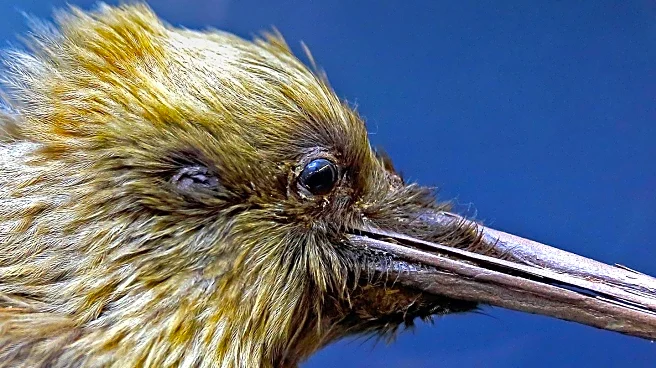What's Happening?
New Zealand is undertaking a significant conservation initiative aimed at eradicating invasive predators by 2050 to protect its unique bird species, such as the kiwi. The project involves widespread public participation, with volunteers engaging in activities like trapping invasive species in their local areas. These efforts are crucial as New Zealand's native birds, which evolved without land mammals, are highly vulnerable to predators like rats and possums. The government is leading the charge, but community involvement is essential for the project's success. The initiative reflects a strong national commitment to conservation and the preservation of the country's natural heritage.
Why It's Important?
This conservation effort is critical for maintaining New Zealand's biodiversity, as many of its bird species are found nowhere else in the world. The project highlights the importance of public engagement in environmental conservation, demonstrating how collective action can address ecological challenges. The success of this initiative could serve as a model for other countries facing similar issues with invasive species. Additionally, it underscores the ethical considerations in conservation, balancing the need to protect native species with the humane treatment of invasive animals. The project also reflects broader societal values of environmental stewardship and responsibility.
What's Next?
The ambitious goal of eradicating invasive predators by 2050 will require ongoing public support and possibly new technological solutions. Conservation experts emphasize the need for continued vigilance and adaptation of strategies to ensure long-term success. The initiative may also prompt further discussions on ethical conservation practices and the role of technology in achieving ecological goals. As the project progresses, it will be important to monitor its impact on both the environment and public attitudes towards conservation.
Beyond the Headlines
The initiative raises important ethical questions about the methods used in conservation, particularly the culling of invasive species. It also highlights the cultural significance of New Zealand's native wildlife and the societal commitment to preserving it. The project could lead to increased awareness and education about the impacts of invasive species and the importance of biodiversity. Additionally, it may influence global conservation strategies, encouraging other nations to adopt similar community-driven approaches.








